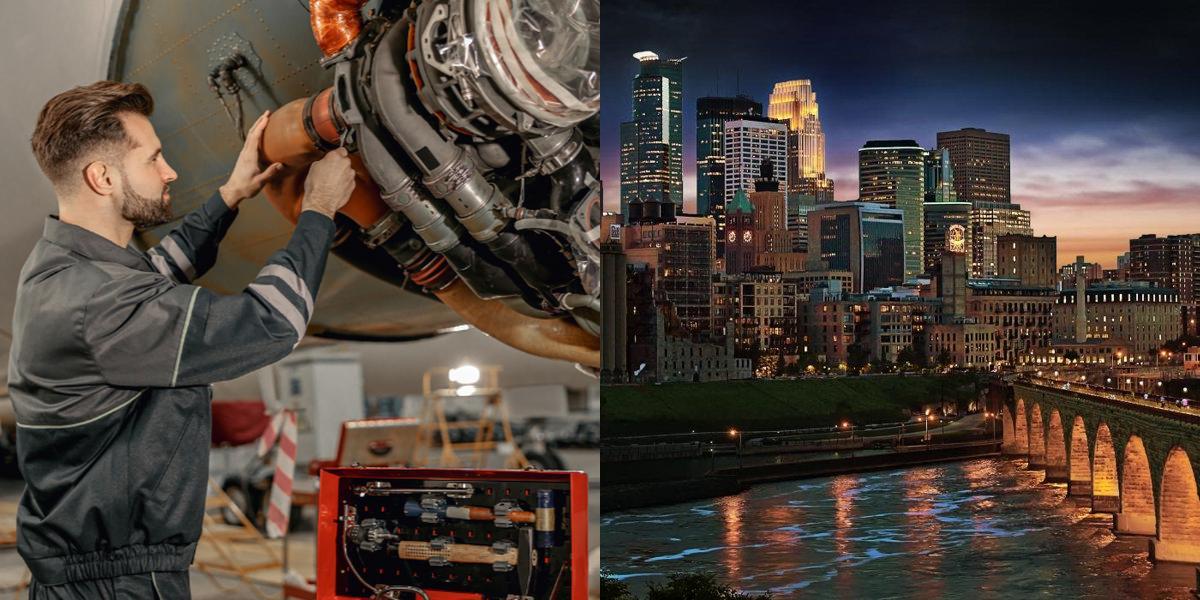How to Become an Aviation Mechanic in Minnesota

Aviation mechanics, also known as aircraft mechanics or aviation technicians, are professionals responsible for inspecting, repairing, and maintaining aircraft to ensure their safe operation. They play a crucial role in the aviation industry by keeping planes in optimal condition.
Step 2: Network
Networking can be an effective way to find job opportunities in the aviation industry. Attend aviation industry conferences, job fairs, and other industry events to meet professionals in the field and make connections. Join online forums or social media groups related to aviation mechanics to connect with others in the industry and stay updated on job openings.
Step 3: Apply for Jobs
Once you have your resume polished and have made some connections in the industry, start applying for aviation mechanic positions. Look for job postings on aviation job boards, company websites, and other online job platforms. Tailor your application to each specific job by highlighting relevant skills and experience.
Step 4: Prepare for Interviews
If your application is successful, you may be invited for an interview. Prepare for the interview by researching the company and familiarizing yourself with the types of aircraft they work on. Be prepared to answer questions about your experience, skills, and knowledge as an aviation mechanic. Practice your interview skills and be ready to demonstrate your passion for aviation and commitment to safety.
Step 5: Gain Additional Certifications or Specializations
To stand out from other candidates and increase your job prospects as an aviation mechanic, consider gaining additional certifications or specializations. This could include certifications in specific aircraft models or systems, avionics training, or specialized training in areas such as composite repair or sheet metal fabrication. These additional certifications can demonstrate your dedication to continuous learning and make you a more attractive candidate to employers.
Step 6: Consider Apprenticeships or Internships
If you are having trouble finding employment as an aviation mechanic, consider applying for apprenticeships or internships. These opportunities can provide valuable hands-on experience and help you build connections in the industry. While these positions may not offer the same level of compensation as full-time employment, they can be a stepping stone to a successful career as an aviation mechanic.
Career Paths and Opportunities after Becoming an Aviation Mechanic
Once you have obtained your aviation mechanic certification and secured a job in the field, there are various career paths and opportunities available to you. Here are a few examples:
Aircraft Maintenance Technician
As an aircraft maintenance technician, you will be responsible for inspecting, repairing, and maintaining aircraft to ensure they are safe to fly. This can involve tasks such as routine inspections, troubleshooting mechanical issues, and performing scheduled maintenance. Aircraft maintenance technicians can work for airlines, aircraft manufacturers, repair stations, or private aviation companies.
Avionics Technician
Avionics technicians specialize in the electronic systems of aircraft, including communication, navigation, and flight control systems. They are responsible for installing, maintaining, and troubleshooting avionics equipment to ensure the aircraft's electronic systems are functioning correctly. Avionics technicians can work for airlines, avionics repair stations, or aircraft manufacturers.
Quality Assurance Inspector
Quality assurance inspectors are responsible for ensuring that aircraft maintenance and repair work meets regulatory requirements and industry standards. They inspect completed work, review maintenance records, and perform audits to ensure compliance with safety regulations. Quality assurance inspectors can work for airlines, maintenance facilities, or regulatory agencies.
Aircraft Inspector
Aircraft inspectors are responsible for conducting thorough inspections of aircraft to ensure they are in compliance with safety regulations. They inspect aircraft structures, systems, and components to identify any defects or damage that may affect the aircraft's airworthiness. Aircraft inspectors can work for airlines, regulatory agencies, or aircraft manufacturers.
Maintenance Manager
Maintenance managers oversee the maintenance and repair operations of an aviation company. They are responsible for managing a team of aviation mechanics, coordinating maintenance schedules, and ensuring compliance with safety regulations. Maintenance managers can work for airlines, maintenance facilities, or aircraft manufacturers.
Continuing Education and Specializations
After becoming an aviation mechanic, you may choose to pursue further education or specializations to expand your career opportunities. This could include obtaining additional certifications in specific aircraft models or systems, pursuing a degree in aviation management, or specializing in areas such as avionics or aircraft structures. Continuing education and specializations can help you advance in your career and increase your earning potential.
Final Thoughts
Becoming an aviation mechanic can be a rewarding career choice for those with a passion for aviation and a desire to work with their hands. By following the steps outlined in this guide, you can obtain your aviation mechanic certification and start your journey towards a fulfilling career in the field. Remember to stay updated on industry trends, continue learning and gaining experience, and take advantage of networking opportunities to maximize your job prospects as an aviation mechanic. Good luck on your journey to becoming an aviation mechanic!
If you're thinking of a new career path, Dreambound offers in-depth guides to understand various job choices:

Sunshine is a member of the School Growth team at Dreambound, where she assists students and schools with their billing and onboarding needs. She is a licensed mechanical engineer. Outside of work, she enjoys road trips with her family, discovering cozy cafes, and exploring her love for art.




